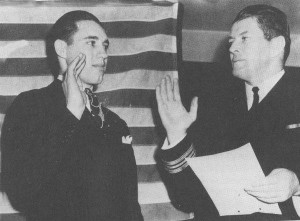Bob Feller Enlists in Navy Two Days After Pearl Harbor Reports for Duty at Norfolk, VA January 6, 1942
After the attack on Pearl Harbor, Hawaii, on 7 December 1941, Major League Baseball Commissioner Kenesaw Mountain Landis wrote to President Franklin Roosevelt, asking him, “What do you want [baseball] to do? . . .We await your order.” The President replied, “I honestly feel it would be best for the country to keep baseball going.” With this recommendation, the league began a massive effort to support the war. However, some players chose a more patriotic path. Waiving his draft deferment as the sole provider for his family, pitcher Robert Feller enlisted in the Navy on 9 December 1941, becoming the first Major League player to join the service. From Naval History Blog, Read more
Bob Feller interrupted one of the greatest pitching careers in the history of Major League Baseball, in order to join the U.S, Navy. He enlisted two days after the attack on Pearl and reported for duty at Norfolk, VA on January 6, 1942.
When he joined the Navy, Feller was at the peak of his career. He had been selected to the American League All Star Team in each of the four seasons, prior to his enlistment, compiling a 93-44 record. He averaged 245 strikeouts per season and 23 complete games.
There were no radar guns back then, so, as a promotion, his fastball was clocked side-by-side against a speeding motorcycle, and Feller’s fastball won, going around 100 mph. There was no stopping him.
Then, on Dec. 7, 1941, the Japanese attacked Pearl Harbor, and two days later, Feller — the best pitcher in the game, and one of the highest-paid players at $30,000 a year — enlisted in the Navy; From ESPN, Read more
It was Dec. 7, 1941. I was driving to my meeting with my Cleveland Indians bosses to hash out my 1942 contract, and out it came on the radio: the Japanese had bombed Pearl Harbor.
The last thing on my mind right then was playing baseball. I immediately decided to enlist in the United States Navy. I didn’t have to — I was 23 and strong-bodied, you bet, but with my father terminally ill back in Van Meter, Iowa, I was exempt from military service.
From the NY Times, Read more
